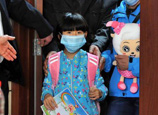
Premier says economic growth at reasonable level in 1st quarter
Premier Li Keqiang called for better efforts to ensure growth and boost domestic consumption, as the State Council met to review the economy's performance and map out its policy focus in the coming months.
The State Council met two days after the release of quarterly GDP figures, which some observers described as below their expectations.
The National Bureau of Statistics reported on Monday that GDP growth in the first quarter was 7.7 percent year-on-year, compared with 7.9 percent in the fourth quarter, and 7.4 percent in the third quarter of 2012.
Li said first quarter growth was at a "reasonable level".
While pointing out the general steadiness of the economy's progress and positive signs in the urban job market, the premier acknowledged "new contradictions" and that there is still room to tap the country's potential in industrialization and urbanization.
The premier said China is at a critical period in its transformation from an economy primarily led by manufacturing and exports to one driven more by services and domestic consumption.
The State Council expressed readiness to make greater headway in reforms, while keeping macroeconomic policies largely steady.
It stressed that greater effort must be made to combine the use of "proactive fiscal policy", which often means government-planned investment in public projects, and "prudent monetary policy", which means caution in the overall management of credit supply.
Five near-term tasks were mapped out by the State Council.
The first is to introduce more consumer-friendly policies to encourage people to spend more on medical care, personal development during retirement and cultural interests. In the meantime, adequate funds will sustain the development of urban roads and rail transport, as well as public environmental facilities.
Second, the country's agricultural base should be protected so that an ample supply of farm products can help it steer clear of risk from abrupt price rises.
Third, more is to be done to improve the general welfare by providing jobs, medical care, financial support to students from low-income families and government subsidized housing units.
Fourth, reforms will reduce the number of official approvals, adjust the tax system and pricing practice for key production materials, further liberalize interest rates, move toward renminbi convertibility in the capital account and open up service industries.
Fifth, the State Council also highlighted the need to control the risk of local government indebtedness.

















 Restaurant told to end promotion with bikini waitresses
Restaurant told to end promotion with bikini waitresses


![]()
